How Did Black Friday Get Its Name? The Story Behind The Day After Thanksgiving Shopping Holiday

Although some American consumers wait all year for Black Friday to get the best deal on typically expensive items, the celebrated shopping day has a somber history. The term was not always synonymous with bargain prices but was coined following a financial crisis, Time reported.
The term "Black Friday" was first reportedly used to describe the U.S. gold stock market crash in 1869. There are several myths as to why Black Friday is called “Black Friday” but the most popular one pertains to Philadelphia police officers creating the term. In the 1950s, officers would use the term to refer to the day when locals and tourists flood the city for the Army-Navy football game that takes place on Saturday in November or December. The influx of gatherers before the game resulted in an increase in crime and traffic, forcing officers to contain the chaotic crowds while taking longer shifts.
"It was a double whammy. Traffic cops were required to work 12-hour shifts, no one could take off and people would flood the sidewalks, parking lots and streets. The cops had to deal with it all and coined the term," Bonnie Taylor-Blake, a researcher at the University of North Carolina, told CNN.
By the 1960s, merchants tried to change the term to something that wasn’t as dark and attempted to change “Black Friday” to “Big Friday.” The variation of the name never caught on.
Some incorrectly believe that because retailers would record their losses in red and their profits in black, Black Friday represented the day when they were able to make the most profit for the year. "That's just not the case on where the name came from," Taylor-Blake said.
By the late 1980s, retailers found a way to turn “Black Friday” around and consumers no longer thought of the day as something negative.
Although “Black Friday” is known as a time where retailers experience major profits, the Saturday before Christmas is reportedly the most profitable time for stores. Nonetheless, every year on the day after Thanksgiving, consumers converge on stores trying to find the best deals. The now celebrated shopping day has inspired other retail shopping days, like Small-Business Saturday and Cyber Monday.
© Copyright IBTimes 2025. All rights reserved.






















